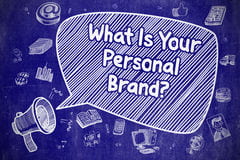How do you build a personal brand that distinguishes you from others?

You start by recognizing what a personal brand is not. It’s not a product. And it is not based on how many followers you have on Twitter, Instagram, Facebook or LinkedIn accounts.
Your brand is more than this. It is what you stand for, what you believe in, and how your values are reflected in your work and your interaction with others. Put simply, your personal brand is your story…it’s your reputation.
So where do you begin to build your brand in a way that distinguishes you from others?
You begin by becoming a great listener. This means using all your senses in really listening to what others are saying, thinking, and doing.
According to numerous studies, 60 percent of executives spend most of their time listening, 55 percent of college students’ communication time is spent listening, and one of the most important factors in committed relationships is listening. At the same time, studies have also shown most people exaggerate their ability to listen.
According to Rebecca Shafir, author of The Zen of Listening: Mindful Communication in the Age of Distraction, “A good listener is not only one who processes the spoken word and the meaning behind the words accurately, but one who makes the speaker feel valued…it helps us better understand the how and why of their views.”
So if you want to develop a strong brand that distinguishes you from others, start by focusing on building your listening skills.
Here are five suggestions:
First, do an honest assessment of your listening skills.
- Do you often pretend you’re listening to someone when you’re thinking of something else?
- Do you hold court and fail to let others in on the discussion?
- Do you tend to select things you want to hear and ignore other things you don’t believe are important?
- Do you consider comments you don’t want to deal with as personal attacks?
- Do you often interrupt people who are speaking?
- Rather than listening to everything someone is saying, do you start thinking what you are going to say next?
Second, Identify the most important things you need to correct. Then each day pick one or two that you want to focus on. At the end of the day, reflect on your performance. You will most likely need to spend more time on some skills than others. What you want to do is to develop new habits to replace the old ones.
Third, develop strategies to tackle each of the areas you need to improve. If you tend to interrupt others in one on one discussions or at meetings, make a note of this when you can – after your personal discussion or during the meeting. Remember that listening is more than hearing words. It involves all your senses. What, for example, is the speaker communicating via gestures, tone of voice, facial expressions, movement, etc.?
Fourth, learn how to ask questions to clarify meaning and to encourage the speaker to elaborate on what he or she has said. Paraphrasing what someone has said, for example, is one of the best ways to demonstrate that you are listening intently. In heated discussions, use a thoughtful question to slow the pace and lessen the tension. It will also give you a moment to demonstrate your understanding so that you can respond carefully and with less emotion when it’s your turn to respond.
And fifth, another important skill to develop empathy. Most people don’t get listened to enough, and being able to empathize with folks is appreciated. It shows you recognizes them and their feelings, even though you may not agree with them.
One of the greatest financiers and philanthropists of the 20th century was Bernard Baruch who had a stellar reputation – and personal brand – as a great listener. He was ahead of his time and once remarked, “Most of the successful people I’ve known are the ones who do more listening than talking.”
For more information on listening, visit Active Listening: Hearing What People Are Really Saying and (2) Mindful Listening: Developing Awareness to Listen Fully
Authored by Dr. Sean Gresh, Faculty